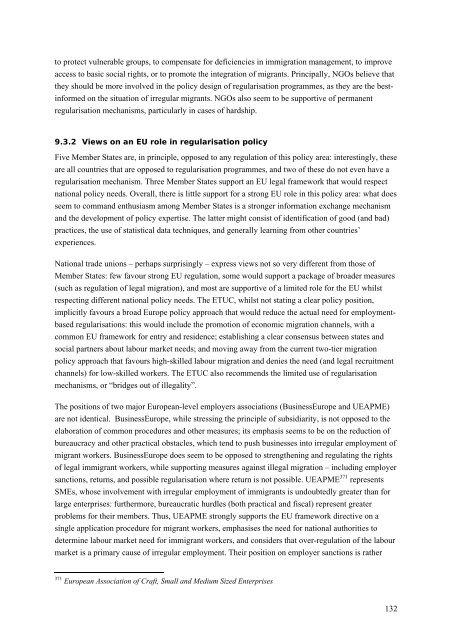REGINE Regularisations in Europe Final Report - European ...
REGINE Regularisations in Europe Final Report - European ...
REGINE Regularisations in Europe Final Report - European ...
Create successful ePaper yourself
Turn your PDF publications into a flip-book with our unique Google optimized e-Paper software.
to protect vulnerable groups, to compensate for deficiencies <strong>in</strong> immigration management, to improve<br />
access to basic social rights, or to promote the <strong>in</strong>tegration of migrants. Pr<strong>in</strong>cipally, NGOs believe that<br />
they should be more <strong>in</strong>volved <strong>in</strong> the policy design of regularisation programmes, as they are the best<strong>in</strong>formed<br />
on the situation of irregular migrants. NGOs also seem to be supportive of permanent<br />
regularisation mechanisms, particularly <strong>in</strong> cases of hardship.<br />
9.3.2 Views on an EU role <strong>in</strong> regularisation policy<br />
Five Member States are, <strong>in</strong> pr<strong>in</strong>ciple, opposed to any regulation of this policy area: <strong>in</strong>terest<strong>in</strong>gly, these<br />
are all countries that are opposed to regularisation programmes, and two of these do not even have a<br />
regularisation mechanism. Three Member States support an EU legal framework that would respect<br />
national policy needs. Overall, there is little support for a strong EU role <strong>in</strong> this policy area: what does<br />
seem to command enthusiasm among Member States is a stronger <strong>in</strong>formation exchange mechanism<br />
and the development of policy expertise. The latter might consist of identification of good (and bad)<br />
practices, the use of statistical data techniques, and generally learn<strong>in</strong>g from other countries’<br />
experiences.<br />
National trade unions – perhaps surpris<strong>in</strong>gly – express views not so very different from those of<br />
Member States: few favour strong EU regulation, some would support a package of broader measures<br />
(such as regulation of legal migration), and most are supportive of a limited role for the EU whilst<br />
respect<strong>in</strong>g different national policy needs. The ETUC, whilst not stat<strong>in</strong>g a clear policy position,<br />
implicitly favours a broad <strong>Europe</strong> policy approach that would reduce the actual need for employmentbased<br />
regularisations: this would <strong>in</strong>clude the promotion of economic migration channels, with a<br />
common EU framework for entry and residence; establish<strong>in</strong>g a clear consensus between states and<br />
social partners about labour market needs; and mov<strong>in</strong>g away from the current two-tier migration<br />
policy approach that favours high-skilled labour migration and denies the need (and legal recruitment<br />
channels) for low-skilled workers. The ETUC also recommends the limited use of regularisation<br />
mechanisms, or “bridges out of illegality”.<br />
The positions of two major <strong>Europe</strong>an-level employers associations (Bus<strong>in</strong>ess<strong>Europe</strong> and UEAPME)<br />
are not identical. Bus<strong>in</strong>ess<strong>Europe</strong>, while stress<strong>in</strong>g the pr<strong>in</strong>ciple of subsidiarity, is not opposed to the<br />
elaboration of common procedures and other measures; its emphasis seems to be on the reduction of<br />
bureaucracy and other practical obstacles, which tend to push bus<strong>in</strong>esses <strong>in</strong>to irregular employment of<br />
migrant workers. Bus<strong>in</strong>ess<strong>Europe</strong> does seem to be opposed to strengthen<strong>in</strong>g and regulat<strong>in</strong>g the rights<br />
of legal immigrant workers, while support<strong>in</strong>g measures aga<strong>in</strong>st illegal migration – <strong>in</strong>clud<strong>in</strong>g employer<br />
sanctions, returns, and possible regularisation where return is not possible. UEAPME 371 represents<br />
SMEs, whose <strong>in</strong>volvement with irregular employment of immigrants is undoubtedly greater than for<br />
large enterprises: furthermore, bureaucratic hurdles (both practical and fiscal) represent greater<br />
problems for their members. Thus, UEAPME strongly supports the EU framework directive on a<br />
s<strong>in</strong>gle application procedure for migrant workers, emphasises the need for national authorities to<br />
determ<strong>in</strong>e labour market need for immigrant workers, and considers that over-regulation of the labour<br />
market is a primary cause of irregular employment. Their position on employer sanctions is rather<br />
371 <strong>Europe</strong>an Association of Craft, Small and Medium Sized Enterprises<br />
132
















